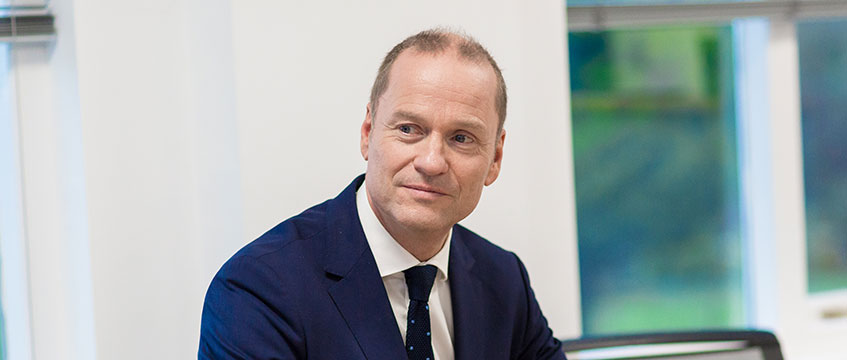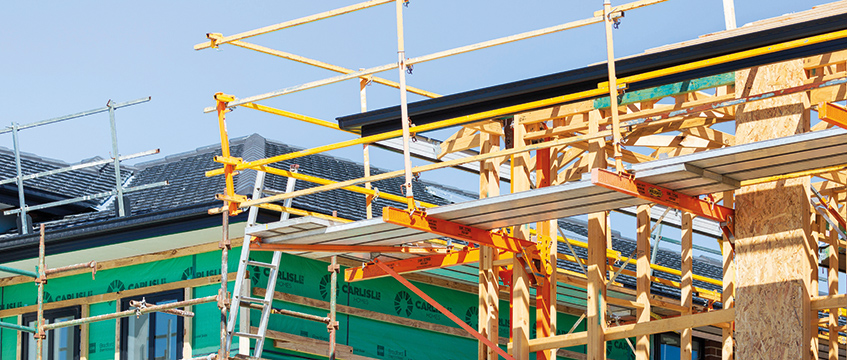The chief executive of real estate group Henry Boot has mapped out his path to build “a bigger, better and more profitable business” as markets recover.
Tim Roberts has led the business for the past five years, having spent the bulk of his career at British Land, latterly as head of offices. As Henry Boot published its results for the year to 31 December 2024, Roberts told Estates Gazette that the group has “changed and evolved” since he arrived in early 2020.
Revenue was down by about 8.5% year-on-year at £328.4m, with pretax profit dropping by close to a fifth at £30.7m due to higher costs. Net asset value per share increased by 3.6% to 317p, and the group sealed almost £350m of property, land and home sales during the year.
“That’s a good result in what’s been a slow market,” Roberts said.
“We’ve got resilient demand at a time when markets have been uncertain. A lot of that is to do with the fact we’re in the quality end of houses, land and commercial development. It’s the old adage: if you’re developing good quality product, usually the demand is there. It will ebb and flow like all demand, but it doesn’t go away, and that’s what we’ve experienced.”
A year of two halves
Many of Henry Boot’s wins came in the second half of the year. In September, its Hallam Land strategic land division sold 491 residential plots at Pickford Gate Coventry to housebuilder Barratt Developments.
Since the year-end, the company has offloaded a further 632 plots in Coventry to Vistry Group. Together with a deal to sell employment land at the site to Royal London, those deals brought in £102m, Roberts said, highlighting the scale of Hallam’s dealmaking in the market.
The group’s HBD development arm has formed a joint venture with Feldberg Capital for a UK-focused industrial and logistics platform.
The Origin joint venture was seeded with three sites from HBD’s own pipeline, with a combined GDV of around £100m, of which HBD owns £25m. “That’s going to allow us to accelerate our industrial development program over the next three or four years,” Roberts said.
And finally, the group agreed a deal to take full ownership of housebuilder Stonebridge Homes Group, buying the 50% share it does not own from JV partner Stonebridge Projects. The deal is structured to complete in three tranches over the next five years.
Roberts described such deals as part of ongoing efforts to “shape the business”.
“We’ve been active in shaping the business – we’ve carried out some strategic initiatives, we’ve got a strong balance sheet – so we think that as the markets recover we’ll sell more property and that will then cover increasing costs,” he said. “We believe that we can get back on track and keep on growing the business and keep on growing the P&L.”
Right ingredients
This reshaping means the group is in a different place to when Roberts joined.
“It’s changed and it’s evolved,” he said. “We’ve got greater focus. We describe that we’re in three markets: industrial, urban development and residential. We’ve also got greater focus in that we want the business to be about land promotion, development and housebuilding. We’ve got a clear route now to owning the whole of Stonebridge, and therefore we can grow it with greater conviction.”
Imminent projects include a £1bn innovation and technology project known as Golden Valley close to GCHQ in Cheltenham. HBD has lodged two outline planning applications that it hopes will be approved during the first half of this year, covering 1m sq ft of commercial space and 1,000 homes. “Cyber, innovation and security is absolutely top of the list both in terms of occupier demand and also government support,” Roberts said of that development.
A matter of pride for Roberts when it comes to planning applications is that his team predicted that the changes to the National Planning Policy Framework would give the company to move faster on lodging plans – and acted accordingly.
“We believed the NPPF would change and it would materially free up the planning system,” he said. “We put our money where our mouth is. We started to recruit people and we’ve we put more resource into Hallam through recruitment and through systems. That means tat we’re capable of putting applications in for 10, 000 plots over the next 12 months and that would be versus a normal run rate of two and a half thousand plots.”
So after a year in which the pace picked up in the second half, Roberts is now keen not to let momentum waver.
“What we have to do is get through this period of uncertainty, which I’m sure we will as a country and as a market, and then really show to everybody that these ingredients are going to mean that we’re going to be a bigger, better and more profitable business,” he said. “I’m convinced we will because we’ve been thoughtful about it and we’ve already seen some good signs.”











